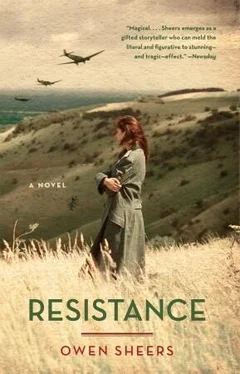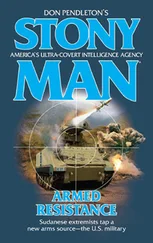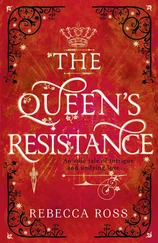George opened his mouth to speak, but Atkins held up his hand to stop him.
“What I’m going to propose to you may sound unusual, but I assure you I’m serious. Before I go any further, however, I’ll need a promise of your complete discretion. As I’m sure you understand, everything I tell you is strictly confidential.”
He reached into the pocket of his jacket and drew out a small black Bible.
“We can’t have any signing of papers with this business, I’m afraid, so I’m going to have to ask you to swear on this instead.” He held out the Bible. George looked at it, both his hands dug deep in his pockets.
“If you have no objection, Mr. Bowen?”
George looked down at him, this man who called himself Tommy Atkins. He thought of the Ministry of Information posters he’d seen at the railway station. “Vigilance at all times.” “Loose talk costs lives.”
“I’m sorry, sir,” he said, “but how do I know who you are? That you are who you say you are? Shouldn’t you show me some identification?”
Atkins looked down at his feet for a moment, then back up at George, nodding his head. “I suppose I should, Mr. Bowen, I suppose I should. But really, what’s the use of me showing you some papers? Easiest thing in the world to forge, you know that. Never trust someone’s identification, Mr. Bowen, never. Please, sit down.” He gestured to the ground in front of him as if showing George to a chair in his office. George remained standing by his scythe. Atkins’s smile tightened. He looked out over the patchwork of summer fields and sighed. In the distance a horse and cart were making halting progress between a pattern of haystacks in the field opposite them. A team of men followed, pitching the loose hay up into the cart, their voices caught in snatches on the light breeze. A darker expression passed over his face, the brief shadow of a thought. He took a deep breath, inhaling the sweet smell of the freshly cut bracken at his feet.
“You have a scar on your left shin approximately two inches long,” he said, still looking out over the fields. “You fell out of a tree when you were six years old and broke your arm. You have some scarring on your right lung, the result of a bout of pleurisy when you were twelve. You’re slightly deaf in your left ear, possibly also as a result of the fall from the tree.” He turned to look at George. “Incidentally, this is what they’ll cite if you accept my proposal. Unfit for duty due to deafness.” A smile twitched at the corner of his mouth again. “You see, George, I know more about you than you do about yourself.”
He held out the Bible. “Are you sure you don’t want to hear what I’ve got to say? I’ll be honest, I think you’re making a mistake if you don’t.”
George looked back at Atkins, meeting his stare. He bit his lower lip. Atkins kept the Bible held out towards him but said nothing further. George took his right hand out of his pocket and laid it on the leather cover.
“Good lad,” Atkins said, “now repeat after me …”
And that was how it began. In a field four years ago, Atkins reciting by rote, in a tone that reminded George of when they said the Lord’s Prayer at school, the Oath of Allegiance, the Defence Act, and the Official Secrets Act. At the end of each sentence he paused for George to repeat his words. When they’d finished Atkins put the Bible back in his jacket pocket, asked George to sit down, and told him everything. He told him about Operation Sea Lion, Hitler’s directive for the invasion of Britain. About the government’s plan for a resistance movement to be activated in the event of such an invasion. He explained to George how this organisation, the Auxiliary Units, would live or die not just on its weapons and its training but also on its information, on its eyes and ears. How, if George was willing, he could be part of that listening and watching machine, running messages, observing enemy troop movements. Atkins talked like this for over half an hour, explaining everything in the fullest detail. He wanted George to understand completely, to leave no part of this possible future he was describing unexamined. He returned again and again to the need for absolute secrecy. “No one must know we’ve had this conversation, George; no one. Not your mother or father, your sister, your friends. It’s the same for everyone. Even the men in the operational patrols will only know the other men in their patrol. You won’t know who they are and they certainly won’t know about you. Understand?”
The resistance wouldn’t try to halt the German advance, Atkins explained. That was the job of the army and the Home Guard (George thought of his uncle and his grandfather doing drills in the school yard last week, their uniforms sagging at the knees, broom handles over their shoulders). No, the resistance would retreat to underground bunkers that were, as they spoke, already being constructed by the army. Once the Germans had passed, they’d attack them from behind, sabotaging supply lines, planting roadside bombs, ambushing isolated military posts. The units would not give up, he assured George. “They’ll be well supplied and they’ll be well trained. They’ll give Jerry a bloody hard time, believe me they will.” The reprisals would be severe. Hostages executed. Whole villages wiped out in revenge. The resistance, Atkins told him, would not survive. And neither would he. If the invasion was successful, in the end they would all die. “Fourteen days, that’s what you can expect. Around fourteen days of activity from the date of the invasion.” He looked at George from under his tweed cap, the multicoloured feathers of the fishing flies quivering in the breeze. “Still up for it?”
George averted his eyes from Atkins’s gaze and looked down at his feet for a moment before looking back up at him. “Yes, sir,” he said, frowning.
Atkins leant forward. “You don’t have to call me ‘sir,’ you know? Mr. Atkins is fine.” Then, giving George a tap on the shoulder like a judge striking his gavel to signal court out of session, he stood up and put on his jacket. Reaching into an inside pocket, he drew out a sheaf of papers.
“These are for you. This is rice paper. It’s edible. Only ever write your observations on this. If you think you’re going to get caught, eat them.” He tore off a corner and handed it to George. “Try a bit, not as bad as all that. Bit like the gum the Yanks chew.”
George bit off a piece of the paper and chewed on it as Atkins unfolded another sheet. It was illustrated with hand-drawn symbols: rectangles and triangles patterned with shaded crosses and chevrons. “These,” he said, “are the insignia of every German unit from the Hook of Holland to Cap Gris Nez. I want you to learn them all by heart. I’ll test you on them when we meet next week, so make sure you do learn them, George. You might need them even sooner than that.” He handed the sheet to him. “That’s all for now,” he said, then turned away and began walking back across the field towards the lane. “I’ll see you next week,” he called over his shoulder.
“Sir?”
Atkins turned back, one eyebrow cocked.
“Sorry. Mr. Atkins.”
“Yes, George?”
“How will I know where to meet you?”
Atkins gave another of his sudden smiles. “Better start checking those drop points, hadn’t you, George?” Then he turned away again and kept walking towards the gate, the smile shedding from his face immediately. He hated this. Too much like fattening lambs for slaughter. This boy, he looked so young. With his dusting of a moustache, his sunburnt ears, his fair hair cut under a bowl by his mother. What chance did he stand? But then what chance did any of them stand once the beachheads were breached? Just 167 anti-tank guns in the whole of the country, museums being ransacked for three-hundred-year-old canons. He glanced back at George as he climbed over the gate into the lane. He was already back at work, the bracken bowing before the swing of his scythe like Japanese courtiers before their emperor. Atkins knew he had to do this. What else could they do? But that didn’t mean he had to like it. He mounted his bicycle and cycled on down the lane, the rhythmical swish of George’s scythe rising and falling as he passed him on the other side of the hedge. It was he, Atkins thought, him, “Tommy Atkins,” with his secrets and promises, not George, who should be holding that scythe.
Читать дальше












